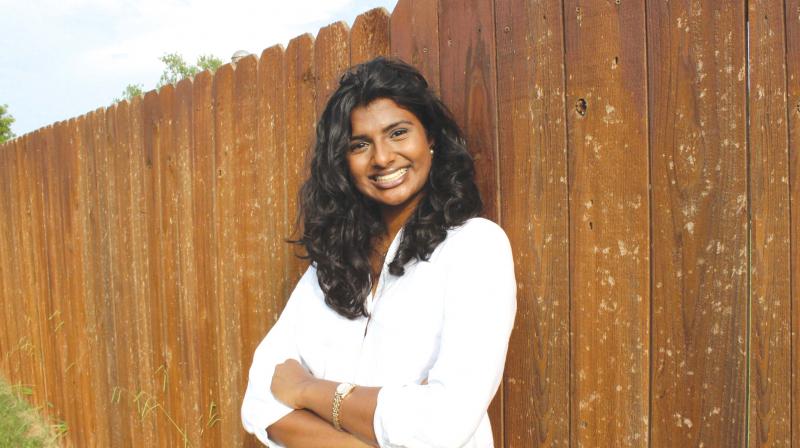UNFAIR' obsession
Aswathi Thomas, whose blog on her experience as a dark skinned girl' went viral, tells us how Indians carry their trail overseas.

This is probably the saddest thing to say about this story — that it is not new. It is an old problem. It continues to exist through all that sea of changes the world’s been through. But then Aswathi Thomas has got to be heard. Or read, as the case is here. And about one lakh people have already. She has written a beautiful piece on her blog and for those with very little time on their hands, suffice to read the title: ‘I’m Indian, I’m dark, and I don’t care’.
She is only in the 11th grade and if she should write ‘My experiences have helped me grow as a person and taught me that the only thing I had to change about myself was nothing’, you can guess what she’s been through today is not all that different from what dark people had been going through for decades. And if any of us had an idea that the story might be different in a progressive place like America, wrong again. Aswathi is from Texas, born to a Malayali dad and a Banglaorean mom.
But she has known what ‘colorism’ is in Indian society. “I’ve faced the same problem within Indian communities in Texas and honestly there is no difference.
This twisted Indian mindset that ‘to be fair is to be pretty and to be dark is not’ is, unfortunately, the same virtually anywhere,” Aswathi writes in an email interview.
That people all over the world could connect to this is proved by the number of times her blog post got picked and shared. The experiences she has described may have appeared in varying forms in many of our lives, or of those we know.
“I distinctly remember one specific summer night when, after a church basketball practice, some of us girls had gone out to eat. While enjoying our snow cones, a few girls began looking at their arms and began to complain about how their skin had gotten darker over the summer. I can clearly recall one girl saying to another, ‘Just be thankful you don’t look like Aswathi’ followed by another girl saying ‘Yeah no offense but I’m so happy I don’t look like you’. Everyone laughed, but my blood boiled and my eyes burned, never have I had to bite my tongue so hard. I couldn’t believe that someone had actually told me they were HAPPY because they didn't look like me. Those eight words have, to this day, hurt me in unexplainable ways.”
She goes on to write how much she has cried that night and how it changed the way she looked at herself. She adds: “As Indians, ever since we were young we are embedded with this false idea and mentality that to be fair is to be pretty and to be dark is not.” Aswathi could add many more examples. In the interview, she describes a time her fair-skinned friend had got tanned and an Indian uncle told her how her skin had lost all its beauty. She says, “What was worse was that he then proceeded to look at me and say ‘Wow she practically looks like you now!’ Those comments were very rude and hurtful, but it just goes to show that regardless of where in the world one may be, this type of discrimination is very present and pervasive.”
Life changed in her sophomore year when she joined a debate and wrote a speech about colorism and all that she went through. She writes on her blog: “It made me realise that I didn't need to bleach my skin or hide from the sun anymore. It made me realise that I could wear my favourite colour, yellow, and still feel awesome. It made me realise, that after years of hating myself, I truly was beautiful just the way God had made me.”
Caste is behind the prejudice
In my opinion, most prejudices against dark skinned people come in connection with caste differences. Black is Dalit/lower caste, the colour that needs to be suppressed. This prejudice would reflect on other aspects like language and culture and aesthetics. So taunts like ‘Oh you have become real dark’ or ‘Dark skinned girls will not get groom’ have become common, even today.
Sajan Mani, performance artist
Think about girls’ self esteem
How is it ok that we let people filter matches based on skin colour on matrimonial sites? How is it ok that we let skin cream companies run such ridiculous campaigns? Think about what you do to the self esteem of teenage girls when you tell them that you need to be fair to get a job, to find love, to be successful. As if teenage girls didn't already have a million self image issues to deal with.
When I was that age, I was sorry for being visible. Can you imagine that existence? I was sorry that people had to see my face, because so many people told me it was ugly. People would tell my mom in front of me, that she was a bad mother for "making me darker" because she let me play sports which meant constantly being in the sun. I thought I was an inconvenience to the world because no one liked seeing my face and even if I lived and did good work, what good was a life without love? I cannot even begin to imagine what would’ve happened if I didn’t have a loving family and a good support system.
Seema Harindran, NRI Malayali

